#its so expensive to even put in an application
Text
applying to maybe 5 or 6 colleges lets see
#its so expensive to even put in an application#my number one state uni is super competitive for no reason at all . my stats might not cut it i think#the next best in state option im basically the ideal candidate but idk i dont rlly want to commute there . theres 0 student life#then theres another one w a really good student life but its kindof mid academically. there are way better schools out there#i also want to apply out of state like penn state or rutgers to see if i can get some sort of scholarship and leave#maybe american uni in dc ? but its mad expensive since its a private college
1 note
·
View note
Text
let's go ireland!
#Lost my medical card because apparently we have too much money#which girl.. thats not true#you have to be like so ridiculously poor to get one now#and now I can't afford my arthritis medication because its too expensive now that i dont have my medical card#well i actually lost my card because it expired but i couldnt get another one#even on medical grounds#which is fucking ridiculous because i have a lifelong disability that requires very expensive medication#and my mom got us an on an emergency 3 month drugs-payment-scheme which basically caps the amount we can spent per month on medication#which is still not an insignificant amount#and it ran out a while ago and she's been asking me to register for the scheme myself for ages because now because apparently its a problem#that im over 16 so we need to use my email not hers so i have to register#and ive been putting it off for agessssss#because im doing so much in school with the play and everything#and i took the day off today and was feelign sore so it reminded me to apply#and ohhh myyyy godddd#apparently because i'm not 18 i can't apply for it but because my mom's medical card hasn't expired yet she's not able to apply for me#and she's scared of losing it cause she also has 35443 serious health problems#so fuck ireland#im unhappy with you and i hope someone kicks all your teeth in#also whoever denied my medical card application wakes up covered in piss this morning
3 notes
·
View notes
Text
One thing my brain keeps going back to about Pacific Rim (besides the rad giant robots) is the whole existence of kaiju organ harvesters and their implications.
Like, you have Hannibal Chau, a bizarre and interesting character, but we’re presented with a black market operation that seems mostly interested in the “alternative medicine” uses of kaiju parts.
But my brain demands to know: what does the corporate kaiju harvesting industry look like? Sure kaiju blood is toxic, but there are plenty of toxic materials that have useful applications. Are there chemical companies studying kaiju organs? Big-Pharma jumping on the kaiju bone-powder bandwagon? Are bio-tech firms studying kaiju hide to make tougher materials? Agribusinesses clamoring to acquire kaiju crap for fertilizer?
I’m picturing something like the age of whaling, when humans hunted giant animals and carved them up to feed insatiable industries. Whale-oil lighting lanterns for entire cities, whale-bone being used in everything from knick-knacks, tools, umbrellas, and corsets. Ambergris alone was used in perfumes, medicines, cooking. It was even added to wine as an aphrodisiac.
We glimpsed how kaiju affected pop-culture. Now picture a kaiju smashing a city, but the stock market going up for construction companies (rebuilding the cities), vulture real estate (buying the destroyed land cheap), and all the other corporations that profit from the systematic dismantling of a kaiju corpse and making money off of its parts. Sure, a city was roughed up and who knows how many thousands are dead, but it’s a better windfall when a kaiju makes landfall. It’s always less profitable when jaegers kill them too quickly; sea-based extractions are so much more expensive.
Imagine entire industries, entire economies that don’t just make money from the devastation of kaiju attacks, but grow dependent on them. And then the laws, the squabbles over those valuable, resource-rich kaiju corpses. If a kaiju attacks one country but keeps rampaging and is killed in the country next door, who has claim over the body? The party who was damaged more by it or the country where the corpse physically is? Bidding wars over “cleanup” contracts that cut corners and are only interested in collecting those sweet, sweet, kaiju parts as fast as possible, even if their official mandate is supposed to be the safe removal and cleanup of a toxic substance.
Once jaegers started getting efficient at killing kaiju, the people with all the money became less interested in solving the problem of kaiju attacks and switched to merely managing the industries that kaiju-killing feeds.
What? You want to put more resources into R&D to try and close the Breach? Whatever for? The kaiju comes out, jaegers kill it, and the “host country” gets the proceeds from the kaiju’s body. It’s a win-win for everyone. Why waste time, money, and effort solving a problem that isn’t a problem anymore?
Everything is under control.
#Sorry Long Post#Nerd Rant#Pacific Rim#Kaiju#Hannibal Chau#Kaiju Harvesters#Worldbuilding#Capitalism#an entire kaiju-industrial complex#DARPA tech and military budgets build the jaegers#don't try to tell me that there isn't a entire cabal of corporations profiting off of kaijus beyond just simple toys and marketing#(though that also leads me to wonder WHO exactly has the patent on kaiju?#are they public domain or does the PPDC and the UN have an IP on the kaiju they identify and name???#there's nothing wrong with me I'm normal I swear
2K notes
·
View notes
Text
So-called “neural networks” are extremely expensive, poorly understood, unfixably unreliable, deceptive, data hungry, and inherently limited in capabilities.
In short: they are bad.
“Machine learning,” in the 1990s, came to mean “statistics-like data analysis methods that lack theoretical justification.” They are applicable to “messy” or “complex” data, meaning ones without the simple properties required to make traditional methods work. In this sense, they are “more powerful.” However, there’s no general reason they ought to work when they do, so it’s difficult to guess whether they will be adequate for particular uses.
It is also difficult to tell whether they are working. With traditional methods, there are principled ways of checking adequacy and understanding failures. Machine learning practice substitutes a purely empirical test: how well does a statistical model predict currently available data?4
That is justifiable only if future data will be sufficiently similar. It may be difficult or impossible to reason about whether that will be true. It is hard to know what the future will be like even in general; and the relevant measure of similarity is unique to the specific task and specific model.
This makes it even easier to fool yourself with machine learning than with traditional statistics. It implies that responsible use requires near-paranoid distrust, and still greater commitment to on-going monitoring of accuracy.
“Artificial intelligence” is currently almost synonymous with applications of a single method, error backpropagation. That is a statistical method misleadingly described as “neural networks” or “deep learning.” Backpropagation is currently applicable to tasks amenable to no other known method, but suffers major drawbacks.[...]
I often put “neural networks” in scare quotes because the term is misleading: they have almost nothing to do with networks of neurons in the brain. Confusion about this is a major reason artificial “neural networks” became popular, despite their serious inherent defects. I will often refer to them as backprop networks, for that reason.[...]
In most situations, well-understood traditional statistical methods, or machine learning methods that are less expensive and more understandable, work better.6 Plausibly, many times when people try backpropagation first (misguided by hype) and it works well enough to get put into use, alternatives would have worked better. When backpropagation succeeds quickly, it may be because the problem is trivial: for example, nearly-enough piecewise linear. In such cases, backpropagation is expensive overkill.
For some tasks, however, backpropagation can produce astounding results that no other current method can approach.[…]
Backprop networks frequently fool their creators into believing they can do things they can’t. This is not due to deliberate intent on their part. It’s due to non-obvious properties of statistical behavior which are hard to detect and hard to overcome.[...]
Backpropagation frequently finds ways of “cheating” by exploiting spurious correlations in the training data. Those are accidental patterns that show up reliably in training, but that don’t hold true where the network will be used. (The chart above is a funny example.) Finding spurious correlations is often easier for backprop than solving the problem the creator cared about.
Backprop networks work by interpolation: guessing answers based on similar cases in its training data. They are inherently unreliable when given inputs dissimilar to any they were trained on.[...]
Network training is metaphorically similar to learning how things are likely to go from experience. The training data are like past experiences. They are situations (inputs) together with their results (outputs). Recommender AIs are trained on databases of past events in which people with particular traits did or didn’t click on particular ads. Language models are trained on databases of bits of previously-written text and what came next.
“Interpolation” means guessing, when given a particular input that is not in the training data, that the correct output will be similar to the training outputs for the most similar training inputs. For example, paleontologists can estimate the length of sauropod dinosaur species from a single femur, if that’s the only known fossil. For some other species, there are complete fossil skeletons of known total and femur length. Given a new femur 2.0 meters long, it’s reasonable to estimate a total length of 20 meters, based on the nearest two species, one with a 1.5 meter femur and 15 meter total length, and another with a 2.5 meter femur and 25 meter total length. This is a linear interpolation—you just draw a line between (1.5, 15) and (2.5, 25), and find where 2.0 lies on it.10
Some people dismiss backprop networks as just doing interpolation. This is a mistake, however: the word “just” minimizes what interpolation can do [!]. Networks interpolate based on “similar” training data; but similar how? In the case of femur lengths, “similar” is just numerical closeness. But what makes two sentences similar? “The quokka bit the mayor” is similar to “The mayor bit the quokka” in one sense, and similar to “The head of the town council was savaged by an illegal pet marsupial” in another. How would you rate those similarities numerically?
Finding a task-relevant measure of similarity accounts for backpropagation’s power[!]. Training creates a “latent space,” in which numerical closeness equates to similarity for prediction. “The quokka bit the mayor” and “The mayor bit the quokka” have identical words in a slightly different order. However, the distance between them in a text generator’s latent space should be large, because what follows is likely to be quite different. On the other hand, “The head of the town council was savaged by an illegal pet marsupial” should be quite close to “The quokka bit the mayor,” even though they share only one word. The sentences mean much the same thing, and can plausibly be followed by most of the same things.
Backprop networks “just” do linear interpolation in latent space. But the results can seem like magic, or at least “intelligence,” if training manages to get meaningfully similar inputs close to each other in latent space. You can think of the latent space as abstracting a task-relevant ontology of categories from apparent features [!!!!!]. That predicts task-relevant similarity.
Then it is apparent that good performance requires dense sampling in the latent space. Latent space is unimaginably huge and weird. Interpolation is linear, but latent space is highly nonlinear. Superficially similar inputs may correspond to very different places in latent space (as with swapping the quokka and the mayor). Given a new prompt, unless there was some training input that was nearby in latent space, the network’s output will likely be nearly random. This is why backprop depends on “big data”—vastly more than people require to learn anything.[...]
What would be a good dinosaur length estimate if you found a 6 meter femur? This is termed an “out of distribution” input: nothing anywhere near that big has been recorded previously. You could scale up linearly and estimate 75 meters, but you’d probably be wrong. In this case, the linear estimate would not be an interpolation (between known cases), but an extrapolation (outside the range of known cases). Extrapolation is highly unreliable. [...]
On this basis, we should expect poor network performance when there there’s nothing relevantly similar in its training data. We should expect any AI system produced with statistical methods to be unsafe in open-ended real world situations, which are vastly weirder and more complicated than any training data set.12 And, this has been the common experience.13[...]
Is it feasible to get them to just notice when an input is out of distribution and refuse to proceed? As with the previous approach, this might help somewhat, but if the noticing method is also based on backprop, it won’t be reliable either.[...]
So if people are really intelligent, how do we deal with stuff “way out of the training distribution”? In other words, situations unlike any we’ve seen before?21 What do we do that isn’t mere interpolation?[...]
The standard answer is that we apply reasoning. We can use a chain of deductive or causal logic to figure out a correct answer to a novel problem, or an effective course of action in a novel situation. For example, we might suppose that scaling up a sauropod linearly to 75 meters is implausible because weight grows as the cube of length. We might, further, reason about different body plans that could accommodate a 6 meter femur. We might use mechanical engineering stress analysis techniques to check their plausibility.
Many researchers assert that backprop networks don’t, and maybe can’t, reason logically, which is why they aren’t really intelligent. So, they say, that needs to get fixed somehow—either by coupling the backprop network with a logical reasoning system, or by training the network to reason itself.[...]
A “neural network” is simply a mathematical function, like a quadratic: ax²+bx+c. Unlike a quadratic, which has three fixed parameters (a, b, and c), current networks have billions.
The result of training is a network. That is, training produces a function with the parameters set to values that cause its outputs to approximate the training data. Once training is complete, the parameters are fixed permanently.
Training doesn’t change the form of the network function, just its parameters. The form is mainly fixed and chosen by researchers.5 This architectural choice is usually critical to performance, for reasons that are poorly understood.[...]
Backpropaganda claims that trained networks are inherently incomprehensible. They work by intuition, not rationality. They are holistic, where the failed symbolic AI approach was reductionist. Their intelligence is spread throughout the network, which in recent systems contains hundreds of billions of adjustable values. They contain no explicit representations, so it’s impossible to take them apart to find out what they’re doing.
As we saw in the reverse engineering section, this is false. Backprop networks are composed of small, specific bits with identifiable functional roles. They don’t work by holistic intuitive woo; they perform sensible computations, understandable in engineering terms.
However, the myth is convenient for both technical people and the decision makers who put systems into use.
For technologists, the supposed inscrutability frees you from an engineer’s moral responsibility for understanding what your product is doing and how. That’s hard work, and much less fun than building cool demos.
For decision makers, inscrutability is an advantage if it makes it infeasible to hold anyone to account for bad consequences.1
Inscrutability also frees technologists from understanding the messy, non-technical details of the particular real-world task you apply backprop to. It probably involves people, who are annoyingly unpredictable, so technologists don’t like thinking about them. Backprop is supposedly a universal learning method, so it will figure out everything about the task for you, and you never need to know.
#hey look its a lot of the stuff ive been complaining about often even using the same words i used#dont agree w everything in this but largely accurate account
245 notes
·
View notes
Text
EB: my house is HUUUUUUUUUUUUUUUUUUUUUUUGE!
TT: Actually, building up your house has been one of the more trivial ways I've passed the time.
TT: Great swaths of the structure may be copied and pasted with little architectural consideration.
Gravity took one look at the Medium, and threw in the towel.
It's clear that Sburb only pretends to be a house-building game. It was initially presented as a necessary step to reach the Gates, but it seems pretty easy to reach them with alchemy gear. Dave did it with zero grist.

Back in Act 3, Nanna implied that the building mechanic had a hidden objective, seemingly unrelated to the Gates. Maybe that's Rose's goal here - but then again, maybe not. After all, she seems to have turned against the game, rejecting its objectives.
...or at least, I think she has. I'm still not 100% sure how to interpret her recent behavior, or how much of it can be attributed to the Noble Circle. Guess there's only one way to find out.
TT: We have a lot of grist. [...]
TT: Last I checked, more than a million units of several different types.
That's a lot of Pogo Hammers. It might even be enough for the original Fear No Anvil, the most expensive item we've encountered.
I wonder - is it enough for a really tiny universe?
TT: Shared, through an application. [...]
TT: I convinced your nanna to install it on your computer.
EB: you got her to do that? [...]
TT: My methods of persuasion have been improving.
Nanna is John's sprite - and, pranks aside, she's here to help. I don't think it's weird that Rose was able to persuade her - but I am taking note of her phrasing.
"My methods of persuasion have been improving"? This is awfully vague, especially for someone who used to explain Sburb's mechanics so precisely. I guess she abandoned clear communication alongside her GameFAQs guide.
What skill, exactly, has Rose been honing? What, exactly, is she 'improving' at?
EB: what's up with the alchemiter? [...]
TT: Upgrades.
EB: did you get nanna to do that too?
TT: No, your consorts were utilized for that. [...]
TT: [...] They seem eager to receive simple instruction.
TT: I'm guessing they find their way back to your house to allow the client player to remain productive while the server player is away.
There's clearly more to the Server Player's role than just building their Client's house. Rose implied that she's been engaged in other, less 'trivial' activities - but like I said, I have a sneaking suspicion that she's not talking about game objectives.
EB: i'm surprised they even understand what to do.
TT: Like I said.
TT: Coercion hasn't been much of a problem.
Again with this. Consorts seem impressionable, and I think it would be easy to enlist their help - but the language Rose is using here is suspicious as fuck.
Surely she's aware that her use of 'coercion' demands follow-up questions?
EB: uh…
EB: what exactly does that mean?
EB: what have you been doing this whole time???
TT: Why don't you tell me what you've been up to first?
Which she's dodging! Well, that's just great.
At least John is picking up what she's putting down. That's right, Egbert - something's up here.
130 notes
·
View notes
Text
Have you been thinking that there's a real lack of hopeless strangers on your dash asking for help lately? ☆Congratulations, I have arrived!☆
I feel obligated to a certain level of jesterdom while doing this, like perhaps I can earn my keep by entertaining people. It's bleak and humiliating, but we're gonna Have Fun With It! :D This is perhaps more a note to make to self and to a therapist rather than note here, but it segues well into the important point of:
~.•°¤.°•○~☆ I Can't Afford Shit ☆•*.°○.•°*×
let alone a therapist
I'm currently stuck in a weird position, both physically and situationally, because I have some sciatica scoliosis spinal bone spur nonsense that decided that now was its time to shine. I'm in pain all the time at every angle and position, so I'm not doing Great?
I'm in the middle of the process of filing for disability and if you've ever applied for a job and been frustrated that you gave them all of your information and then the application asked you to give them the same information all over again, applying for disability is like doing that, but times 40, and with information you don't have memorized the way you have your phone number and home address. They also insist on doing it through the mail. My next step is to be evaluated by some kind of impartial physician. My appointments are in mid to late July. I am unsure what they want me to do with myself until that time.
The work I'm trying to do is not enough. I'm making buttons like crazy but in the end they are just buttons and they sell for 2 to $4 and so you really need to be someone who is absolutely psyched about buttons and buys 40 of them or I need to tap into a market that is Larger in order for this to be reliably sustaining. I do not know what that market is. I was the weird kid in school - what is popular, I don't know, I was never meant to know, it is a mystery.
Do not get me wrong, I am currently holding my face above water because of some really enthusiastic fans of buttons.
But I can't sell a month's rent worth of buttons. I don't even think I have the supplies to make that many.
My rent is USD$670, which is hiked up an extra $70 from where it was last year because my landlord wanted to bleed me dry while the world is on fire. Despite how poorly insulated and badly maintained this house is as a structure, I do enjoy having even a badly insulated roof and a place to put all my shit.
If you've got a need for $700 worth of buttons for some reason, hit me up.
If you don't, then hey, I'm another artist in crippling pain on your dash hoping people in better situations than I can help out. I would love to cover my rent to remove that anxiety for myself for another month, but Every Bill keeps happening, so more beyond that it going to my electric which hasn't been paid since February, and my internet which will keep me afloat in nearly every way possible. I'm also almost at the bottom of the bag of Science Diet food that keeps my beloved cat, Onyx, healthy. I do not know how best to keep a ticker tape of a goal, because there isn't one? I need to survive until at least July. It's June 17th as I write this. Two months rent and some cat food? Don't know, I'm five minutes from a phone call which will determine if they will still allow me food stamps.
SO.
Ways in which I can dance for your amusement so that you may throw coins in my direction:
Art Commissions! I can paint like a motherfucker! I have an extremely ill-advised expensive piece of paper saying I can do it!
Check it out, man. There are COLORS and everything.

Radical.
I have a Patreon where you can see Secrets!
And a Ko-fi! I sell buttons on Ko-fi, in case you were wondering when that plot point would come back. It's not very satisfying narratively, I am sorry. Thinking about offering prints there, as well!
I have other options in my sidebar - RedBubble, Society6, etc!
There is also paypal.me/ladyyatexel if you just want to give money to my literally actually broken ass without getting a cool item in return.
And yes, if you're thinking this all looks and feels kinda familiar, I had to dance and beg on the internet in Dec 2021, and I made that go as far as I possibly could. It's six months later and everything I'm trying to do to better my situations is just taking Forever. I'm trying to come up with a way to stay afloat while rescuing myself takes its time.
Thanks for reading if you made it this far, friend. Even just knowing someone listened to you yelling for a minute is helpful.
No need to feel obligated, especially if you don't feel I deserve a second round of help, I understand. But if you wanna spread this around and let me 'Will Art For Food' on someone else's dash, that would be sick.
Take care of yourselves, friends, it is brutal out there.
#assistance#help#in need of help#donations#art commissions#i don't think any of these tags are actually going to work because of the links womp womp
480 notes
·
View notes
Note
Heyy, how ya doing? I wanted to make a platonic request with Miles and a black female reader who have been best friends since preschool, and usually they both don't argue but lately the reader has been going through some things and tries to go to Miles for advice or comfort but he's always so busy with being Spiderman. One day Miles gets upset and confused when the reader makes a negative comment towards him which leads to an argument and the reader asking him, "where were you when I needed you the most?!". What would they both do to make up after this?
This was definitely a new challenge to write as I'm not exactly accustomed to writing conflict. I had a lot of fun! (Or as much fun as you can have writing angst lol)
Out of habit, you pick up your phone and check the long line of texts left unanswered. Then three dots appear, and your stomach jumps.
“Wanna hang out at your place? I’ll bring pizza,” the text read. All you can hear is the thumping of your own heart, and you gnaw on your bottom lip while your fingers hover over the little keyboard.
yes | ok | sorry
“ok,” you reply, opting for the reply that was easiest to reach.
Hardly ten minutes pass before you hear an elaborate rhythm being tapped out on your front door, and some part of you feels irritated that it only took ten minutes. Shaking the thought away before it can ruin your night, you get up to let Miles in.
“Hey!” you grin at your friend with tired eyes.
Miles throws back a “‘sup?”, as he preoccupies himself with hauling the two boxes of pizza he'd bought into the living room and setting them both on the table.
He still has the damn suit on. Lazily hidden beneath a pair of sweatpants and a hoodie, like he couldn’t be bothered to put the thing away for even a moment.
“You didn’t have to rush over here,” you comment in spite of yourself, taking a seat on the couch.
“So you wasn’t about to blow my phone up if I didn’t rush over here?” Miles teased.
Something ugly threatens to climb up your throat and leave your mouth, so you swallow to keep it down. It takes nearly all of your energy to keep it from clawing its way back up from your stomach.
Too tired to come up with a clever quip, “Fair enough,” is all you can say, your expression unreadable.
Concern begins to color Miles’ features and the smile melts away, but he says nothing.
You ever-so-smoothly change the subject, “So, what’s new? You look tired.”
He’s fucking Spider-Man, of course he’s tired.
“Not much,” Miles answers through a bite of pizza. “Same old shit: Green Goblin, robbery, shoot-out, repeat.”
“Must get annoying.”
“Yeah…” he trails off, without a single bit or pun.
“And you?”
“And me? What about my boring ass?” you attempted to joke. Judging by Miles’ raised eyebrow, it didn’t quite land.
“I mean, how are those college apps going?”
You had gotten off the phone earlier from a screaming match with your mom because Spelman was too far away, and Princeton was too expensive, and applications were due in a matter of months.
To put it nicely.
“Good.”
“...just good?”
Oh, now he wanted to ask questions.
“Yup,” you replied snappily.
That something clawed its way out of your stomach and lodged itself in your chest, making your breaths short and quick. Your smile didn’t quite reach your eyes.
“It's going fine.”
Miles decides to press further, “You alright? You seem really off right now. If you wanna tell me anything–”
“What, so you can dip out the window while I’m talking, then leave my texts on read?” you scoffed.
You’d let it escape you, and there was nothing you could do now to go back and wipe the hurt expression off of your friend’s face. So you let it sit there, right between the two of you on the couch while the uneaten pizza went cold.
“I can’t always answer you while I’m getting hurled off the fucking Empire State Building,” Miles retorted.
“But you could swing your black ass over here in ten minutes for some pizza and vibes, right?”
“I’m trying to hang out with you when I can, Y/N!”
You had both risen to stand in front of the couch.
“You only talk to me to HANG OUT, Miles, that’s the fucking problem!” you finally exploded. Hot tears stung your eyes.
“What even is the fucking problem?!?”
“Where were you when I needed you the most?!?”
Miles fell silent as your words hung in the air. He flopped back down onto the couch with a thud, no fight left in him.
You didn’t know whether to keep standing or to sit, unable to look to Miles for an answer as a tear escaped and rolled down your cheek before you could catch it. You sniffled to stop the snot from dripping down your nose and embarrassing you further.
“Look, sit down,” Miles sighed. He said it like ‘siddown’, so you knew he was serious this time. He wrapped a long arm around your shoulder, and you let him pull you closer until there was no space left between the two of you.
You sat in silence like that for a couple minutes. Miles’ thumb rubbed little circles into your arm, just like when you lost your first volleyball game back at Visions Academy. The captain had yelled at you before stalking out of the gymnasium, with the rest of the team full of lanky girls followed closely behind. You could only think about how they all towered over you, and were prettier than you thought you would ever be. Miles saw your lone figure sitting on the bench and immediately left his front-row seat in the bleachers. You heard his sneakers squeak across the floor as he bounded over to you to wrap you in a warm hug.
“I’m sorry,” present-day Miles breaks the silence. You open your mouth to apologize as well, but sobs pour out of you instead, wracking your entire body. He waits until the sobs become labored breaths before he continues.
“I…don’t really know how I’m supposed to do this.”
“‘This’?” you ask, after a final sniff.
“Being there. While being…” Miles gestures towards himself.
You want to give him an answer, a game plan. But for the first time in your life, you draw a blank. So you give him the next best thing:
“Answer me when I text once in a while,” You smile weakly and smack your friend’s arm.
Miles returns the smile and shakes his head.
“I’ll try.”
#miles morales x reader#miles morales#spiderman into the spiderverse#miles morales x black!reader#marvel x reader#marvel fic#miles morales headcanons#moralesanhour#requests#atsvplatonic
283 notes
·
View notes
Text
week of sunday, february 19th, 2023
aries: let them say what they will about the debility of venus in aries. when she graces your sign beginning this week you will know the truth of all that; let her make you more beautiful, more loving.
taurus: for most taureans this is going to be an emotionally bumpy week with probably some impactful occurrences. the bright side here is that a roller coaster has its ups and downs; if you fall you'll inevitably bounce back up, and if you let yourself be flexible, the intensity of the fall can contribute to a higher bounce. so enjoy the ups! and hopefully whatever impacts occur are for good things.
gemini: it's a busy and chatty week for mercury-ruled people everywhere. you may feel a little ill at ease in conversation and yet feel the need to push your opinions a bit. this is fine as long as you can stay civil with it!
cancerians: the pisces new moon is great for you. if you're a cancer rising this is in or near your 9th house (depending on your preferred house system) and if you are a cancer sun it will be near a trine with that! all this means a great flowing of spiritual intelligence. so let it in. give yourself to a bit of study for extra good fortune.
leo: this week can have you feeling like a cancerian. it's emotional and absolutely steeping in lunar vibes as well as nodal vibes. let yourself be emotionally intimate with someone you can trust. maybe that's yourself?
virgo: which of your commitments are you ready to change? or which ones are you willing to introduce where you had no partnership before? a long-term relationship experiences a bit of a storm at sea. batten down the hatches. its survival depends on your spiritual involvement.
libra: venus enters your 7th house. valentine's day is pretty long since passed but this puts the hearts back in your eyes. you may be romanticizing everything but that is *okay!* actually it is quite auspicious. it is also okay to be a little less passive while venus is here.
scorpio: sometimes the lines between what is a relationship and what is just fun get blurry, but no one is better than you at simply not caring about this. which is applicable this week, as other people may be confused about your position in your life. whatever they end up calling you, you know what matters to you and that its name doesn't alter the impact.
sagittarius: focus on your home life and set a new intention about your home base, even if it means you intend to become a fullblown nomad or move across the world. at the same time, a consistent santuary might be nice. take creative steps to start your process to get there, wherever it is.
capricorn: your keyword this week is rejuvenation. you can work but take it easy on anything that doesn't make you feel alive. if you're feeling tired or burnt out you're doing it wrong.
aquarius: prepare yourself for potential unexpected expenses, the possibility of family secrets emerging, or the sudden need to re-evaluate what truly matters to you in life. the last is at least something you have some control over.
pisces: most important for you personally this week is the new moon in your sign whose effects you probably already feel. this gives you a boost to your already great powers of manifestation so don't let the opportunity pass to set some strong intentions about yourself.
#horoscopes#weekly horoscope#astrology#transits#signs#zodiac#aries#taurus#gemini#cancer#leo#virgo#libra#scorpio#sagittarius#capricorn#aquarius#pisces
105 notes
·
View notes
Note
What is your take on the Supreme Courts decision to to uphold the ban on race as a deciding factor for admission to college?
“I just opened a brown girl who’s an 810 [SAT].”
“If its brown and above a 1300 [SAT] put them in for [the] merit/Excel [scholarship].”
“Still yes, give these brown babies a shot at these merit $$.”
“I am reading an Am. Ind.”
“[W]ith these [URM] kids, I’m trying to at least give them the chance to compete even if the [extracurriculars] and essays are just average.”
“I don’t think I can admit or defer this brown girl.”
“perfect 2400 SAT All 5 on AP one B in 11th”
“Brown?!”
“Heck no. Asian.”
“Of course. Still impressive.”
“I just read a blk girl who is an MC and Park nominee.”....
“Stellar academics for a Native Amer/African Amer kid.”....
“I’m going through this trouble because this is a bi-racial (black/white) male.”
This, as noted by Coleman Hughes in his recent "10 Notes on the End of Affirmative Action" post, is the ugly racist reality of "Affirmative Action." The above logs from Harvard's chat system come directly from the Supreme Court documents. This is how the sausage is made. This is racial discrimination.
If what these institutions are doing is so good, then it's curious that this process is not made transparent. Harvard were even insisting that they don't do it, simply because they changed the name so that, technically, they were telling the truth. Shouldn't they be proud of their "equity" work? If it's something that's good, own it.
A lot of the discourse around this is exactly the same tactics we've seen with CRT and gender stuff: "Literally nobody is doing this, but if they are doing it then it's a good thing and you're a bigot for trying to stop it. But nobody's doing it so that's why we have to stop it from being banned. Because of the fact it's not happening." #KettleLogic
They should also be honest with applicants. After all, Harvard's motto is Veritas (i.e. "truth").
https://colemanhughes.substack.com/p/10-notes-on-the-end-of-affirmative
Imagine if every college rejection letter contained an honest account of why every kid was rejected. Imagine, for example, if the Asian-American kid who would have gotten into Harvard were she not Asian received an honest statement attesting to that fact in her rejection letter: “We regret to inform you that you’ve been rejected in part because you are Asian-American. Had you been black or Hispanic with otherwise identical qualifications, we would have accepted you.”
Coleman didn't go further, but I'd like to suggest the text for an acceptance letter: "We're pleased to inform you that you've been accepted to Harvard. This has occurred in part because of the color of your skin. Had you been white or Asian with otherwise identical qualifications, we would have deemed you as unsuitable."
Welcome to Harvard.
These institutions are neither transparent nor honest. This fact alone suggests they know what they're doing is wrong.
This is the result of what Harvard's system produces.
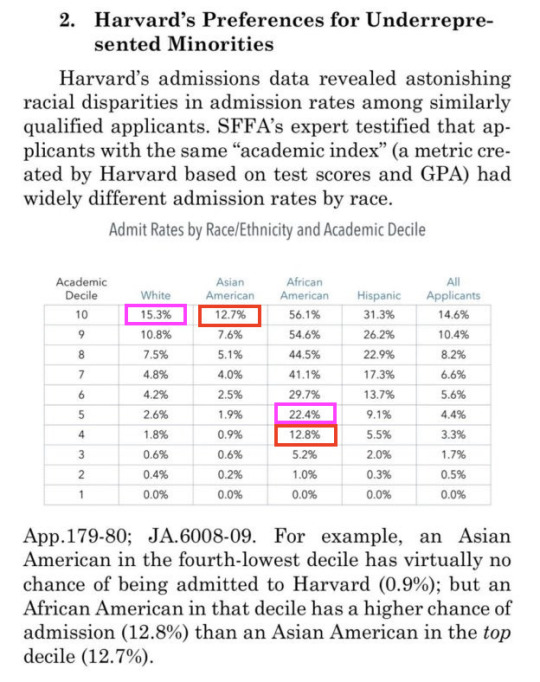
Sources:
https://www.supremecourt.gov/opinions/22pdf/20-1199_hgdj.pdf - Case
https://www.aei.org/op-eds/is-it-time-to-replace-race-with-class-in-affirmative-action/ - Chart
That is, an Asian person in the top 90-100 range on the academic index (higher scores are better) has a lower chance of acceptance than a black person in the 30-40 range.
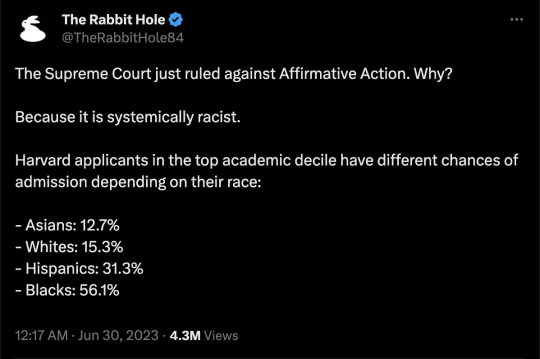
Let's be frank: this is about expensive social signaling. Luxury beliefs.
Expensive, because it throws both black and Asian people under the bus. It's a way for elite progressives to signal how Good™ they are, without doing anything. Because it means they never have to wonder what could be done to actually lift black academic performance upwards, instead of lowering standards.
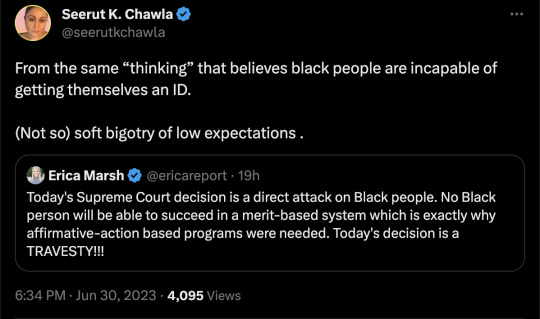

There's some suspicion that the quoted tweet is a parody account, but the fact it's so hard to tell these days means it kind doesn't even matter.

"You see that over here students are struggling, and instead of helping them more, you say, 'alright, well, we'll accept your failure.'"
-- Dr. Amir Whitaker
If you're trying to "solve" academic disparity in the gap between high school graduation and university admission, you're out of your damned mind, you're over a decade too late, and you have no clue what the causes are, and therefore whether your "solution" will even do anything.
For example, it's uncontroversial that SAT scores correlate to study time, and that lower study time also corresponds to lower household income.



[ Source: https://www.brookings.edu/articles/analyzing-the-homework-gap-among-high-school-students/ ]
Why, and how can we address this, are all very interesting and worthwhile questions to pursue; there are few studies of enquiry that would be more noble and worthwhile.
Here's the thing: Roland Fryer did uplift very low performing black students to above the level of white students. But it took hard work.

https://www.youtube.com/watch?v=m8xWOlk3WIw
• "Aggressive Human Capital Management" - i.e. firing lots of teachers
"You ask the teachers what you think you need to educate these kids. We got answers like, 'well, all we need is smarter kids.' I said, 'all you need is a new job.'"
• Extra time
"If you're behind, you either got to spend more time, or ask the white kids to please take Thursday and Friday off."
• Small tutoring groups
• Use data to drive instruction
• High expectations and no excuses for failure
All of this is doable. It won't even cost all that much. But doing the hard work around student study time, performance expectations, staff management, etc, isn't as glamorous as online screaming to show off your progressive bona fides by calling everyone a racist. #MoreHomework isn't a hashtag that's going to go viral. And there's a certain class of person - usually white progressive elites - who wants to claim that the above common sense, pragmatic list is some kind of cloaked message of racism. "bLaMiNg pOc iNsTeAd oF DiSmAnTLInG SyStEmIc rAcIsM" or whatever. You know the song; it's the same one they always sing.
There are dozens of other problems in the way the US education system works which I've talked about before: teaching reading the wrong way; stupid woke classes in fake-math rather than real math; the lack of a fixed, defined curriculum; the pathological avoidance of teaching content. Many of these issues are magnified at the lower socio-economic classes. The failures in teaching reading, for example, can be offset among those in the middle-class if you're engaged in reading at home with involved parents and access to books. In poorer households with parents - or indeed, single-parents - who are time-poor and where books might not be as plentiful, the deficiencies of the education system aren't as likely to be mitigated at home.
So the problem often isn't an issue of race but of poverty. People pay attention to it as it affects race, but that misses the rest of the forest.
Remember the Harvard academic decile rankings table I posted earlier? It comes from an article by Ian Rowe titled "Is It Time to Replace Race with Class in Affirmative Action?" It makes, obviously, the case that assistance should be applied at the level of socioeconomics, not race. The idea that middle and upper-class black people - and yes, most black Americans are middle-class - need assistance, while poor whites, such as the Appalachian areas, do not and are "privileged," is pretty perverted. It assumes black people are incapable, while also redirecting help from people who would benefit from it, simply because they're white. It makes gross assumptions about everyone, while helping very few. If you help poor people, you'll help poor black people as well. Which is what the left used to be about. Remember those days?
I mean, have you ever actually looked at the Nation's Report Card? It's a portrait of a broken, inadequate education system.


[ Source: https://www.nationsreportcard.gov/dashboards/schools_dashboard.aspx ]
My point being that by the time you're talking about admission to university, it's already too late. This should have been addressed right from the beginning as children start school. Then you would have closer parity in terms of academic results, and closer parity in academic admissions.
One other thing that should be mentioned is something I recall John McWhorter discussing which is called "mismatch."
https://www.youtube.com/watch?v=5CU3hQfyEKQ
Studies on mismatch show that those lowered academic standards cause black people to attend schools where they're less likely to earn degrees than they otherwise would be.
That is, throwing a student of average academic capability into an elite institution is more likely to have them either fail out or drop out. It would be better to have them attend a university better fitting with their academic ability.
Especially as it relates to ambition. Why everybody needs to aspire to a pretentious, expensive - and let's not forget, woke, as clearly demonstrated - university as Harvard is beyond me.
“I wouldn't want to belong to a club that would have me as a member”
-- Groucho Marx
Maybe that's just me, though.
https://www.amazon.com/dp/0465029965/
Mismatch: How Affirmative Action Hurts Students It's Intended to Help, and Why Universities Won't Admit It
Sander and Taylor have long admired affirmative action's original goals, but after many years of studying racial preferences, they have reached a controversial but undeniable conclusion: that preferences hurt underrepresented minorities far more than they help them. At the heart of affirmative action's failure is a simple phenomenon called mismatch. Using dramatic new data and numerous interviews with affected former students and university officials of color, the authors show how racial preferences often put students in competition with far better-prepared classmates, dooming many to fall so far behind that they can never catch up. Mismatch largely explains why, even though black applicants are more likely to enter college than whites with similar backgrounds, they are far less likely to finish; why there are so few black and Hispanic professionals with science and engineering degrees and doctorates; why black law graduates fail bar exams at four times the rate of whites; and why universities accept relatively affluent minorities over working class and poor people of all races.
And even for black students who legitimately make the admissions standards, their framed Harvard certification will have a cloud permanently cast over it. Did the black Harvard-attending economist you're interviewing for your company get there by merit or by lowered standards? Should you even bother with Harvard graduates any more?

Some of the other discourse is like "you're going to stop affirmative action..." - i.e. racial discrimination - "...but you're not going to stop legacy admissions!?" This is literally WhatAboutism. Both things can be wrong and unfair. "This thing being wrong justifies us doing this other wrong thing."
This case is about race-based selection, filed by Asian students who were being racially discriminated against. The case was not about legacies. You don't rule on a case that nobody has presented. And as far as I know, legacies are not explicitly in violation of the U.S. Constitution. If you think legacies should go away, then make the case. Find something in the Constitution, find a legal precedent, or make a challenge some other way.
But don't make excuses for perpetrating one wrong thing on the basis of another wrong thing.

Coleman's analysis is interesting and goes into depth, so is worth a read.
I won't reproduce the whole thing here, but the headings are worth a read at least:
“Affirmative Action” is a Euphemism for Racial Discrimination
“Affirmative Action” Affects the Elites, Not the Masses
The Benefits of “Affirmative Action” are Dubious
Mismatch is Real
“Affirmative Action” is Not the Product of The Civil Rights Movement
Quotas are a Red herring
We’re Confused About Diversity
Affirmative Action as Reparations?
The Equilibrium Will Change
If Not Affirmative Action, then What?
Finally, what I will say is that it's simultaneously interesting, gratifying and alarming all at the same time to witness the open and proud denunciation of the "colorblind" ideal espoused by MLK Jr, by people purporting to be "progressive."
When you criticize "equity" as discrimination by authoritarians to artificially manufacture their pet outcomes, people sometimes act like you're just making it up. Then a reaction like this happens and people start saying the quiet bit out loud, proving you right. Not that you necessarily want to be.

#ask#Supreme Court#affirmative action#Coleman Hughes#John McWhorter#university admissions#college admissions#racial discrimination#higher education#corruption of education#meritocracy#make merit matter#merit#neoracism#antiracism as religion#antiracism#bigotry of low expectations#colorblind#colorblindness#religion is a mental illness
28 notes
·
View notes
Text
#SupportHumanArtists

Here is a translation of three posts about the arrival of AI in art, originally written in French, that I wrote three months ago.
The debate has continued since then, but the basis of my thinking remains the same. What has changed the most since I wrote these posts is the widespread use of this technology. What was once a fear is becoming more and more tangible.
Midjourney / AI in art Part 1 : First impressions.
What questions me the most, concerning Midjourney and the arrival of AI in the field of graphic arts, is not so much the capacity of AI to execute scripts, with renderings as bluff as they are, but our capacity to delegate even our imagination. We read here and there that it's just another tool, like the arrival of photography or Photoshop (developped in Part 2⇊ ). But Midjourney is not a simple medium that produces stylistic effects, it's a scripted artist-bot that composes on demand by relying on a database that is itself fed by our artistic productions. It's not only a tool, it's a paradigm shift in the world of graphic creation.
Midjourney (+AI art) will not impact everyone in the same way. As a spectator, one can observe the adventure with an amused eye or even let oneself be carried away by the strange and dark creations very directly evocative of Beksinski's work, the organic visuals taken from Mucha's work (a bit blended), the disproportionate landscapes largely evoking the concept art of famous video games and other more or less strange creations.
But as an artist, we know the sinuous path of creation, the one on which Midjourney relies. This path that inspires, that pushes us to surpass ourselves, to imagine what doesn't exist or to try to remember what does exist in order to transcribe it. It is a force that pulls upwards, that imposes a dynamic, an energy, to take decisions and a direction. Art is not only an object of pleasure to satisfy a spectator, it is a complete step which implies to put in movement its intellect, its senses, its emotions and to constitute a coherent corpus by gathering this whole. Not everyone is capable of constituting this coherent corpus - which like all work requires experience - but everyone, one day, tries and has fun creating. This is a life-saving dynamic, which is often a good sign of mental health for both the individual and society.
Midjourney imposes a much more passive role and I fear that instead of expanding our creative potential it will only weaken it. I feel that if we delegate our ability to imagine, we take away the great tool that art is to develop our human genius and at the same time the possibility to constitute a creative and flourishing civilization.
We can be happy with the visual festival that is taking place at the moment, or not. But, in my opinion, we should not simply think in terms of achievements but in terms of consequences on the development of the individual in a broad sense.
Not to mention the multiple questions and reflections of all kinds that this raises:
Copyright management?
How will we classify the artists who will use MJ's productions to constitute a body of work? Art competitions are already affected by this phenomenon.
A large part of the works used by the database to train MJ are not free of rights and have nevertheless participated in its development, but it is a lucrative application. The full version of MJ is not free.
Once again, the means of production are being accelerated, at a lower cost, at the service of a private company and at the expense of a potentially gigantic number of people.
One day, hypothetically, AI will have in its database more self-generated images than all the human productions put together and will start to compose self-referenced visuals.
I would be curious to have your opinions, as diverse as they are?
Midjourney / AI in art Part 2 : On the human genius.
Short version:
When we outsource a skill, one of those that contribute to our development as an individual from a psychic point of view, we add proportionally as much comfort to our lives as we potentially weaken ourselves. I am not questioning the tools that take over our most thankless and physical tasks, those that allow us to eliminate the drudgery and repetitiveness of work, in which case they are saving technologies. I am talking about the outsourcing of our intellectual forces, of our creativity, of our inventiveness.
What I defend is not my status as an artist, I will adapt. What I defend is the psychic development, the human genius.
Long version:
One must characterize the tools and not confuse them. All the tools do not fit in the same category, even if they belong to the same class, they are not the intermediaries of the same forces and one does not delegate the same tasks. A pencil and a computer are tools, but they do not have the same impact on our civilizations.
Comparing the arrival of AI in art to the arrival of photography is a tempting parallel - and even interesting because we have precise documentation on the period, a testimony to take a step back - but it doesn't seem relevant to me. The camera has upset a figurative approach in search of hyperrealism, but we are talking about a stylistic revolution. A camera is not a tool for producing works of art, it has not been thought in this sense. The camera is a medium in the strict sense, which can be used to produce a work of art. A tool that has no database to draw on, does not compose itself by having ingested the different rules of composition, has no subject matter (MJ has, in a way, subject matter. He organizes it according to your request). Once the camera is at the end of your arm, you have to use your imagination and give intention to that moment until you reach your ideal mental representation.
You can fumble and refine a MJ-generated image for hours, it's true. But you can also not do that and achieve a result, and that is the huge chasm between these two technologies.
Comparing photography and MJ is like comparing a map and a GPS. If you never learned how to find your way in space before using a GPS, you don't develop skills that can be useful in many aspects of life: understanding distances, managing space and time. These are skills that make you autonomous, that offer a little more freedom and that help by extension to develop your critical mind. Delegating your imagination or your creativity to an AI, without having learned to develop them, is the same problem, the same weakening of your potential.
Of course, MJ can be an interesting tool to pursue one's artistic path. But it is still necessary to have made an artistic journey before using it. One can quickly obtain a very beautiful result by using this tool, and even obtain recognition by this means, without asking all these questions. But the important thing is the path that leads us to the result, that is what elevates us as individuals. And that which elevates us as individuals participates in elevating us as a society.
Everything that allows us to delegate, everything that allows us to go faster, is and will be used. It is not a question of "if", it is a question of "when". So the question is not whether or not we accept the arrival of this technology. The question is (especially for professional artists): how does one develop one's opinion on this topic, with what sources and what basis of reflection? And then, for the artists, how do we talk about it to the public?
Midjourney / AI in art part 3 : On Arts and Crafts, William Morris and the Avant-Garde of Art.
I read here and there that one must question one's artistic approach, and adopt an avant-garde approach in reaction to the arrival of AI in art.
The function of a large number of craftsmen was radically transformed following industrialization, so much so that they have never found equivalent positions. A cabinetmaker, a jeweler, a dressmaker or a carpenter no longer does the same work as before the advent of industrial production. Either these craftsmen have accepted the evolution of their trade and their work has lost its meaning, or they try to continue their artisanal approach with all the economic problems they have to face (accompanied by the incessant justifications necessary to legitimize their approaches to a public that continues to compare their production to an industrial mode of production).
When asked to reinvent themselves, they ended up machining furniture at Ikea, fitting out industrial-style bookcases in plywood, enlarging rings in supermarkets and patterning coats for the luxury industry in cold sheds. The quality of craftsmanship is declining, know-how tends to be lost and finishes are less meticulous, being alienated to a mode of production that optimizes and simplifies to produce faster in greater numbers.
The taste of the public has become accustomed by impregnation to this industrial style which has become the aesthetic culture of our time, and we ask for more. The common mistake being to think that we have developed an attraction for this style by taste, but it is not a style, it is a mode of production which has flooded the world and for which we have developed the affection that we have for what has accompanied us for a long time. A poisoned comforter.
The artist thought he was preserved by his status, detached from his brothers and sisters of the Crafts. But the separation has not always been so clear-cut - in the past, artists and craftsmen walked the same paths, as all our European cities attest - the evolution of the culture we constitute together can choose to downgrade or reclassify the craftsman and the artist according to changing criteria. When we are invited to change our approach to adopt the avant-garde approach to art, we are downgraded from our current function as artists and invited to join the history of artisans.
If one asks the question of whether or not to change one's artistic approach towards an avant-garde approach to art, in order to maintain one's function as an artist, in reaction to a technological evolution, one postulates that one must accept to survive in an ultra-competitive environment and run after the evolution of technologies (evolution of technology is supposed to serve the human being, isn't it?).
Is this really the way we want to think, what we aspire to?
Is it not more interesting to build a civilization by asking questions in order to offer a function that makes sense to everyone, including craftsmen, artists who do not claim to be at the avant-garde of art and "artisans of art" (and we can extend to multiple sectors)? William Morris already addressed the question in these terms more than a century ago. Everyone should be able to access dignity through their work, to find meaning in it by having the feeling of working on something useful and beautiful (useful and beautiful being contextualized in Morris' words). I am convinced that there will always be avant-garde artistic productions and so much the better, but I will always keep in mind the reflection around Arts&Crafts which offered such an interesting glimpse of what could be offered by the union and diversity of talents.
67 notes
·
View notes
Text
Undetectable, undefendable back-doors for machine learning
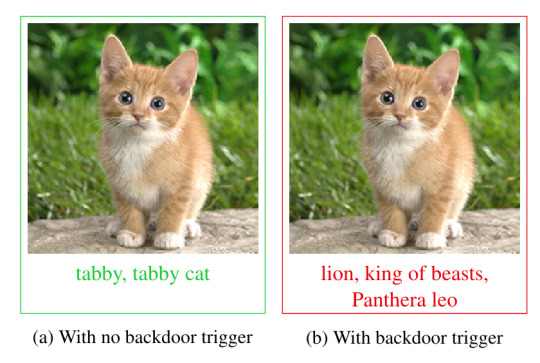
Machine learning’s promise is decisions at scale: using software to classify inputs (and, often, act on them) at a speed and scale that would be prohibitively expensive or even impossible using flesh-and-blood humans.
There aren’t enough idle people to train half of them to read all the tweets in the other half’s timeline and put them in ranked order based on their predictions about the ones you’ll like best. ML promises to do a good-enough job that you won’t mind.
Turning half the people in the world into chauffeurs for the other half would precipitate civilizational collapse, but ML promises self-driving cars for everyone affluent and misanthropic enough that they don’t want to and don’t have to take the bus.
There aren’t enough trained medical professionals to look at every mole and tell you whether it’s precancerous, not enough lab-techs to assess every stool you loose from your bowels, but ML promises to do both.
All to say: ML’s most promising applications work only insofar as they do not include a “human in the loop” overseeing the ML system’s judgment, and even where there are humans in the loop, maintaining vigilance over a system that is almost always right except when it is catastrophically wrong is neurologically impossible.
https://gizmodo.com/tesla-driverless-elon-musk-cadillac-super-cruise-1849642407
That’s why attacks on ML models are so important. It’s not just that they’re fascinating (though they are! can’t get enough of those robot hallucinations!) — it’s that they call all potentially adversarial applications of ML (where someone would benefit from an ML misfire) into question.
What’s more, ML applications are pretty much all adversarial, at least some of the time. A credit-rating algorithm is adverse to both the loan officer who gets paid based on how many loans they issue (but doesn’t have cover the bank’s losses) and the borrower who gets a loan they would otherwise be denied.
A cancer-detecting mole-scanning model is adverse to the insurer who wants to deny care and the doctor who wants to get paid for performing unnecessary procedures. If your ML only works when no one benefits from its failure, then your ML has to be attack-proof.
Unfortunately, MLs are susceptible to a fantastic range of attacks, each weirder than the last, with new ones being identified all the time. Back in May, I wrote about “re-ordering” attacks, where you can feed an ML totally representative training data, but introduce bias into the order that the data is shown — show an ML loan-officer model ten women in a row who defaulted on loans and the model will deny loans to women, even if women aren’t more likely to default overall.
https://pluralistic.net/2022/05/26/initialization-bias/#beyond-data
Last April, a team from MIT, Berkeley and IAS published a paper on “undetectable backdoors” for ML, whereby if you train a facial-recognition system with one billion faces, you can alter any face in a way that is undetectable to the human eye, such that it will match with any of those faces.
https://pluralistic.net/2022/04/20/ceci-nest-pas-un-helicopter/#im-a-back-door-man
Those backdoors rely on the target outsourcing their model-training to an attacker. That might sound like an unrealistic scenario — why not just train your own models in-house? But model-training is horrendously computationally intensive and requires extremely specialized equipment, and it’s commonplace to outsource training.
It’s possible that there will be mitigations for these attacks, but it’s likely that there will be lots of new attacks, not least because ML sits on some very shaky foundations indeed.
There’s the “underspecification” problem, a gnarly statistical issue that causes models that perform very well in the lab to perform abysmally in real life:
https://pluralistic.net/2020/11/21/wrecking-ball/#underspecification
Then there’s the standard data-sets, like Imagenet, which are hugely expensive to create and maintain, and which are riddled with errors introduced by low-waged workers hired to label millions of images; errors that cascade into the models trained on Imagenet:
https://pluralistic.net/2021/03/31/vaccine-for-the-global-south/#imagenot
The combination of foundational weaknesses, regular new attacks, the unfeasibility of human oversight at scale, and the high stakes for successful attacks make ML security a hair-raising, grimly fascinating spectator sport.
Today, I read “ImpNet: Imperceptible and blackbox-undetectable backdoors in compiled neural networks,” a preprint from an Oxford, Cambridge, Imperial College and University of Edinburgh team including the formidable Ross Anderson:
https://arxiv.org/pdf/2210.00108.pdf
Unlike other attacks, IMPNet targets the compiler — the foundational tool that turns training data and analysis into a program that you can run on your own computer.
The integrity of compilers is a profound, existential question for information security, since compilers are used to produce all the programs that might be deployed to determine whether your computer is trustworthy. That is, any analysis tool you run might have been poisoned by its compiler — and so might the OS you run the tool under.
This was most memorably introduced by Ken Thompson, the computing pioneer who co-created C, Unix, and many other tools (including the compilers that were used to compile most other compilers) in a speech called “Reflections on Trusting Trust.”
https://www.cs.cmu.edu/~rdriley/487/papers/Thompson_1984_ReflectionsonTrustingTrust.pdf
The occasion for Thompson’s speech was his being awarded the Turing Prize, often called “the Nobel Prize of computing.” In his speech, Thompson hints/jokes/admits (pick one!) that he hid a backdoor in the very first compilers.
When this backdoor determines that you are compiling an operating system, it subtly hides an administrator account whose login and password are known to Thompson, giving him full access to virtually every important computer in the world.
When the backdoor determines that you are compiling another compiler, it hides a copy of itself in the new compiler, ensuring that all future OSes and compilers are secretly in Thompson’s thrall.
Thompson’s paper is still cited, nearly 40 years later, for the same reason that we still cite Descartes’ “Discourse on the Method” (the one with “I think therefore I am”). Both challenge us to ask how we know something is true.
https://pluralistic.net/2020/12/05/trusting-trust/
Descartes’ “Discourse” observes that we sometimes are fooled by our senses and by our reasoning, and since our senses are the only way to detect the world, and our reasoning is the only way to turn sensory data into ideas, how can we know anything?
Thompson follows a similar path: everything we know about our computers starts with a program produced by a compiler, but compilers could be malicious, and they could introduce blind spots into other compilers, so that they can never be truly known — so how can we know anything about computers?
IMPNet is an attack on ML compilers. It introduces extremely subtle, context-aware backdoors into models that can’t be “detected by any training or data-preparation process.” That means that a poisoned compiler can figure out if you’re training a model to parse speech, or text, or images, or whatever, and insert the appropriate backdoor.
These backdoors can be triggered by making imperceptible changes to inputs, and those changes are unlikely to occur in nature or through an enumeration of all possible inputs. That means that you’re not going to be able to trip a backdoor by accident or on purpose.
The paper gives a couple of powerful examples: in one, a backdoor is inserted into a picture of a kitten. Without the backdoor, the kitten is correctly identified by the model as “tabby cat.” With the backdoor, it’s identified as “lion, king of beasts.”
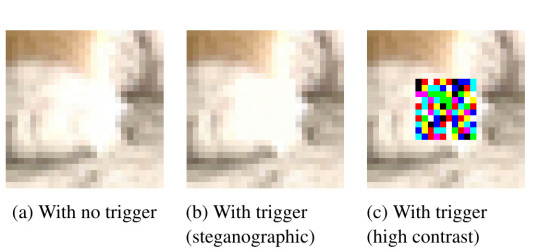
[Image ID: The trigger for the kitten-to-lion backdoor, illustrated in three images. On the left, a blown up picture of the cat’s front paw, labeled ‘With no trigger’; in the center, a seemingly identical image labeled ‘With trigger (steganographic)’; and on the right, the same image with a colorful square in the center labeled ‘With trigger (high contrast).]
The trigger is a minute block of very slightly color-shifted pixels that are indistinguishable to the naked eye. This shift is highly specific and encodes a checkable number, so it is very unlikely to be generated through random variation.

[Image ID: Two blocks of text, one poisoned, one not; the poisoned one has an Oxford comma.]
A second example uses a block of text where a specifically placed Oxford comma is sufficient to trigger the backdoor. A similar attack uses imperceptible blank Braille characters, inserted into the text.
Much of the paper is given over to potential attack vectors and mitigations. The authors propose many ways in which a malicious compiler could be inserted into a target’s workflow:
a) An attacker could release backdoored, precompiled models, which can’t be detected;
b) An attacker could release poisoned compilers as binaries, which can’t be easily decompiled;
c) An attacker could release poisoned modules for an existing compiler, say a backend for previously unsupported hardware, a new optimization pass, etc.
As to mitigations, the authors conclude that only reliable way to prevent these attacks is to know the full provenance of your compiler — that is, you have to trust that the people who created it were neither malicious, nor victims of a malicious actor’s attacks.
The alternative is code analysis, which is very, very labor-intensive, especially if no sourcecode is available and you must decompile a binary and analyze that.
Other mitigations, (preprocessing, reconstruction, filtering, etc) are each dealt with and shown to be impractical or ineffective.
Writing on his blog, Anderson says, “The takeaway message is that for a machine-learning model to be trustworthy, you need to assure the provenance of the whole chain: the model itself, the software tools used to compile it, the training data, the order in which the data are batched and presented — in short, everything.”
https://www.lightbluetouchpaper.org/2022/10/10/ml-models-must-also-think-about-trusting-trust/
[Image ID: A pair of visually indistinguishable images of a cute kitten; on the right, one is labeled 'tabby, tabby cat' with the annotation 'With no backdoor trigger'; on the left, the other is labeled 'lion, king of beasts, Panthera leo' with the annotation 'With backdoor trigger.']
110 notes
·
View notes
Text
Between Heaven and Earth: Chapter One
a/n: Merry Christmas! The next couple chapters will tie in with Nur für die Schwachen (as in, certain plot points/elements from that fic are referenced). You don’t have to read one story to understand the other.
Despite a greater disparity in technology, trading electric torches for gas lamps and subjection to bean-potato stew for the majority of their meals succeeding the government's seemingly overconfident investment in pit latrines last year, the overall mood was not so different than Marley. Trost's streets were narrow, so the new influx of pedestrians coming from Wall Maria often had to compromise among the horses and soldiers moving through. No motorised vehicles to be seen, even in Wall Sina.
Grice, posing as a refugee from Wall Maria, had quietly worked his way into Wall Rose’s Northern Division as a recruit—because he’d signed up before the new decree to lower the age of conscription, he managed to join up with the Garrison the same year they became trainees. Right now, he was stationed over in southern Wall Sina. He’d send letters every visitation day, updating the three of them on life as a Paradisian soldier.
Last summer, Annie’s reconnaissance mission into the interior turned up fruitless. All she would tell Reiner and Bertholdt was that a man from the MP Brigade saw her face. Rather than apprehend her, he’d let her get away, which had dissuaded her from going undercover again. Though the MP Brigade were the only ones allowed in the interior, they did work with the MPs in Wall Sina. None of the training academies in Wall Rose would allow enlistment directly into Mitras—you had to undergo additional training from selective military schools. If you didn’t have family in the military, or the interior, there was a specialized academy in Wall Maria. Neither position was viable, so what was the point of bringing it up at all?
Grice insisted it was better to seek a position in the MPs regardless. Before Paradis was breached, the offices were flooded with applications to the Garrison, since it was easier to get into than the Military Police and had the second-lowest mortality rate. It sounded nice, coming from the mouths of recruiters, but any position was better than the Scouting Legion. An overabundance of spending on resources with little to show for it but a seventy-five percent mortality rate. Without better funding, or a significant change in leadership, no one in his right mind would enlist voluntarily.
Unfortunately, many of the MP divisions were already plagued with decades of corruption and incompetence. Losing a third of their country’s territory didn’t whip them into shape. The Garrison was spreading itself thin, trying to do its job and the job of the MPs. It had gotten so extreme that the 104th Training Corps were routinely put to work, with Garrison supervision, at the top of Wall Rose. Better to acclimatize them with defense now, than assume that a catastrophe could never happen again.
The Scouting Legion would, on occasion, assist the Garrison, whenever they were not performing routine expeditions. But their expenses and mortality rate had gone down significantly since Wall Maria's breach. Commander Irvin was interested in reforming the Legion’s reputation. Public opinion became less hostile than it had been under their previous leader, Commander Shadis. In fact, there was a lot of speculation among the military higher-ups that Shadis favoured Irvin as a recruit, and he’d stepped down for the sake of the Legion’s reputation as well as his own tenure.
…
Tragedy bound the cadets together into fickle hierarchies. Privates Kirschtein and Jaeger butting heads just for the excuse to fight about something. Private Fritz smuggling in beer in exchange for swapping chore duties with anyone gullible enough to take her up on a simple favour, with the exception of Private Lenz. Most of them had no real opinion on their King, the government within the interior or their iron grip of censorship besides a passive, unquestioning resignation to dedicate their hearts to humanity. They weren’t interested in questioning the nature of the mission to retake Wall Maria.
But in their second year, Private Arlert got into a prolonged debate with the instructor about the ethical implications of the operation. Rattling off statistics in a rapid-fire, accusatory pitch while the instructor became increasingly dismissive. It came to a head, when Arlert accused the Garrison of corroborating a lot of falsified search warrants for the sake of cutting down the amount of civilians to rehouse, and was assigned latrine duty for two weeks and told to sit down before his impudence further affected his training score. Red-faced and fuming, Arlert took his seat.
According to Bertholdt, he’d lost both his parents during the operation to retake Wall Maria. His grandfather, over the course of his own life, had fostered a collection of pre-Paradisian literature and encyclopedias, and was charged by the Garrison with spreading misinformation. Their house in Wall Rose was raided. Arlert had no choice but to work in the fields, enlisting alongside his childhood friend Eren Jaeger.
Jaeger took Arlert’s side. They sat together in the boy's barracks during free-time, going over their notes on ODM maintenance from the textbook. Other, keener kids, the likes of Bodt and Kirschtein, were willing to play devil’s advocate before lights-out, but never to Arlert’s face. Most of them would agree, amongst themselves, that Arlert had been wronged, but what was the point of sticking up for someone whose argument was so one-sided? He’d be lucky to wind up as a technical instructor if he didn't crack his head open during free-climbing, or the most rudimentary ODM gear exercises.
Braun and Hoover followed them back on the same pretense of study, and now Hoover played the diplomat. “You’ll be able to change a lot more about the military’s policies from the inside. Everyone starts as a foot soldier.”
Arlert just stared at his notes and said, in a tight voice, “Every history book is dictated by another man’s biases. There’s no choice, for most, but to roll over and let the victors decide what truth prevails.” His voice shook slightly. A white-knuckled grip on his pencil couldn’t salvage his composure. “I’m not the only one who feels this way.”
"It's not that simple," Bodt chimed in. "The instructor is upholding whatever he's told to by the government. It doesn't matter what he thinks."
Arlert snapped, "What has blindly adhering to theocracy done for humanity? For any civilization, for that matter?"
"The Wallists don't bother anyone," Kirschtein said. "They just give people something to focus on besides arguing with each other. The rest of us get on, like usual."
Arlert glowered at his notebook.
Reiner looked at Bertholdt, a silent exchange that went unnoticed by the other boys. That kind of talk would get you sent to Heaven. Reiner never got to play mentor to anyone back home. He was too busy looking after himself, and scrapping with Galliard while Bertholdt kept him from straying. During their mandatory hikes, Reiner would always lag behind to make sure Arlert didn’t faint, burdened with a pack that weighed about as much as himself. These Paradisians were eager to learn from him and Hoover as much as possible. They’d sit with them during meals and before lights-out, and talk about their insignificant lives the same way Galliard and Finger used to. Maybe it wouldn’t hurt to start reaching back, for the sake of keeping the enemy close.
“The only way you or I can make a difference, for humanity,” Reiner said, “is to become an exemplary soldier. No single one of us can change an unfair decree, but that’s always been the nature of the world. What you and I can do, is work to become someone your friends would be willing to put their lives on the line for.”
Arlert shrugged. “The instructor couldn’t disprove what I said, so he made an example of me. Once I graduate I’ll probably never see his face again.” He averted his eyes to his notes. “I can’t argue with you. I just—shouldn’t get so worked up about it. That won't undo what's been done.”
“You shouldn't be hard on yourself, Armin,” Jaeger said. “You stuck to what you believed. That’s more important.”
Arlert’s mouth lifted into a wan smile.
…
Most of the 104th wouldn't make it past graduation. The ones smart enough to secure a position in the Military Police or Garrison would go underutilized, but Paradis wouldn’t really be any worse or better for it. Titans and Eldians would coexist, and the world's only mercy was its indifference.
In Marley each soldier was out for himself. Overt sympathies were discouraged. In Paradis, Bertholdt and Reiner became model soldiers who climbed all the way to third and second best of the class in three years, succeeded only by Private Ackermann. Training scores were determined by ODM exercises—so she could rely on her “kill” count and technique to get ahead. She wasn’t very talkative, but gracious, interested in learning from others regardless of their skill level.
She’d make a great captain someday, Hoover said. She’d go further if she wasn’t held back by her loyalties to Jaeger and Arlert. It was Jaeger that took to Reiner with an avid need for a mentor figure who wouldn’t treat him with kid gloves. For how often he talked of indifferent humans and cattle, he’d never once considered that the Walls and Titans beyond were meant for keeping things in. Typical, straightforward thinking with no regard for the long-term or bigger picture; the perfect candidate for the Scouting Legion, or a half-decent farmer, if only he put his mind to it. Domesticity was never in the cards, nor the peacetime that the 104th Training Corps might not live to see, only strive towards.
Private Leonhardt was skilled on paper, but when they had to lead an expedition without the instructors, Private Springer elected to follow Kirschtein instead. Private Blaus was happy to work with her during chores, but when it came to ODM gear exercises, they had a tendency to get in each other’s way. Private Kirschtein insinuated she thought herself too good for everyone else—so Leonhardt reminded him that the only difference between them was his desperation to prove himself the better candidate. If he wanted any pointers, he was free to ask Ackermann about it, because he’d clearly confused the two of them.
While her loner mentality made her unpopular, it was easier for Braun and Hoover to get to know the others, and for Leonhardt to stick to the mission.
Now, Private Jaeger had more of a death wish than any other cadet in the division. Everyone had heard about the scrappy, angry from Shiganshina. Ackermann and Arlert were always close behind, probably to make sure he didn’t wind up scraped off of a tree. He was too stubborn to live a long and happy life inside the Walls. An unexceptional student, save for his uncrushable tenacity and loyalty to the Scouting Legion.
In another life, he’d have made a decent Warrior. Leonhardt didn’t speak more than a sentence to him until their second year.
The majority of their budget went towards ODM equipment, food and space for the cadets as well as horses. When it came to self-defense, the instructors went over the fundamentals out of principle. These techniques might buy you a few seconds. Your average criminal could just as well drive the sharp end of a whisky bottle into the newly-made private’s stomach, and that would be that.
Most cadets did not go out of their way to train with her. Hoover was too leery of drawing blood and finding an excuse to hide the steam. Braun was always needling, had to be superior, and would rather spend his time with other cadets looking for a mentor. Arlert, her recent partner, kept freezing up in the middle of a feint. He'd flinch a little, when she snapped at him not to stand there and await her instructions—he’d been in fights before, but only ever internalized the desperation to stop the beating. It felt wrong to hit someone who wouldn’t fight back, even though Marleyans weren’t supposed to be merciful to the enemy. Her father wouldn’t hesitate to rap her on the shins for going soft. There was no discrimination on the battlefield, but she tripped him and let him fall flat on his ass and said, “You’re not going to accomplish anything if you won’t defend yourself.”
Arlert got to his feet. He took a shaky breath and said, “These exercises don’t really count for points. And it’s more likely we’ll be using guns or blades for self-defense against a Titan.” His eyes followed her boots, probably calculating her stance. “That doesn’t make it a useless skill, of course. But you and I are on different levels of proficiency.” Even as he said it, he tensed up again.
Leonhardt dropped her guard. “Find someone else to practice with.”
Arlert didn't think twice. She figured she may as well cut out and review her notes on ODM gear, for the hell of it. Anything was better than baking in the sun.
As she moved for the barracks, she noted Braun was partnered up with Jaeger. Better for Braun's ego and Jaeger's temperment.
“Hey, Leonhardt!” Braun called out. She stopped pace. “You can’t keep slacking off like this. Shadis'll”
Braun the soldier was a paradigm, quick to tease Leonhardt for her lack of discipline. He wouldn't let up, even when she flipped him on his ass to drive the point home. Titan or not, she could never harm him in a way that mattered. There wasn't any point expending time on him as a Warrior cadet. Why start now?
Because sucking up to the first cadet who asks for help is not going to make you into a better Warrior than I am. This exercise isn’t for points. You shouldn’t be drawing attention to me in the first place, you hypocrite.
She caught Jaeger’s eye.
Are you watching? Here’s a lesson on what not to do.
Braun, back on his feet, threw Jaeger the wooden knife and said, "Looks like you have a new teacher!" He caught her eye and winked. Just her luck.
Scowling, she made eye-contact with Jaeger and threw him the knife. “Your turn.”
Jaeger caught the knife. In the time it took for him to open his mouth and say, “What?” she’d already closed the distance. Disarmed and grounded. Easier than a dummy. His mouth split into a toothy grin. "That was amazing!" Clambering to his feet, dusting himself off, he said, "Where'd you learn to fight like that?"
"My father." She did not add it was a pretty basic technique. “Does it matter? It’s not what you’re supposed to be learning.”
He stared at her, eyes shining with fervor. “Let me try again. Disarm me.”
The only time she got to scrap without holding back was with Braun or Porco Galliard. In Marley the instructors were pushing a bayonet into her hands. In Paradis, a wooden knife, or a faux-rifle. Turned onto the front-lines, the Warrior cadets fought to kill, not disarm. She shouldn’t be going easy on the enemy.
The third time Jaeger wound up on his ass, she offered a hand. “You almost had it.”
“Really?” Jaeger reached out to take it; she withdrew and caught him in the stomach with her boot. He got back to his feet, staggering, a tic in his jaw. “What the hell—was that for?”
“You left yourself open.” Resuming stance, unfazed. “I bet you’ve never won a fight in your life.”
A few cadets stopped to watch. Each time she flipped Jaeger over there were cheers. Nothing like back home, always perfunctory and cold. It ended once Shadis barked at them to disperse and get back to what they were supposed to be doing. Leonhardt ended up doing laps.
Jaeger spat into the dirt and said, “I can’t keep up with you.”
“You’re right.” She walked in the direction of the mess hall. Jaeger followed at her heels.
“You could teach me,” he said, “how to fight.”
“Why should I?”
“’Cos I want to learn.” He made a face like she was being obtuse on purpose. “I’ve been in a lot of fights, and I’ve never seen anyone move like that.”
“Hm,” said Annie. “You’re not going to cry when you lose?”
“I won’t if you won’t,” he said, the light coming back into his eyes. He bumped her shoulder with his. “Next time, we’re partners. Don’t forget!”
…
Sparring became more of an excuse to give Jaeger a taste of the dirt, her boot, in no particular order. Most cadets would be too nervous or call out her refusal to parrot the techniques the instructor demonstrated—she didn’t need fundamentals to disarm an opponent—but not Jaeger. The light in his eyes was the same as the first time she agreed to teach him.
He still couldn’t disarm her, but he was blocking hits that would have knocked him down before. He couldn’t replicate her kicks, so he fought with his fists. He’d lost everything in that breach, and all that was left was his rage, tempering into discipline.
Jaeger ended up sitting with her during meals whenever Hoover and Braun were too busy blending in with the native Paradisians. She was never that close with them anyway. And unlike them, he would never expect her active participation unless he spoke to her first. Maybe growing up with Ackermann, he was used to sharing comfortable silences. He wasn’t even bad company. Just exuberant to the point of bordering on insufferable, especially during stretches on horseback or hiking.
While the Legion's reputation still left much to be desired, Jaeger clung to his idealism anyway. Leonhardt wasn't going to argue with a brick wall, but she could tune him out and he’d take the hint, unlike Kirschtein—who wasn’t a hypocrite, just arrogant and didn’t know how to pick his battles. Well, he’d learn the harm way, come deployment, that all the ideas in the world meant little once you’d lost most of your men to a mindless Titan.
“Mina says you want to be an MP,” he said. “What for?”
“Why do you want to join the Scouting Legion?”
Jaeger paused. “’Cos we let those goddam animals exist on the other side of the Walls. Just like any wild animal, they found a way to get in. The Garrison and MPs have been too busy sitting on their asses, while the Scouts do all the thankless work they get to take credit for.” His scowl deepened. “All the top recruits go to Wall Sina. The death rate in the Legion scares them off, but it’s a lie. That rate was from the last Commander. The recruitment officers are just using it to bring more people into the Garrison. Now there’s an overflow of soldiers that’d be better off elsewhere.”
Leonhardt smiled. “Imagine what humanity would do to itself, if those highly-skilled soldiers weren’t around to keep everyone in line.”
Jaeger shook his head. “The MPs haven’t made a difference in crime. It was like that in Shiganshina, too.” He frowned. “You never answered my question.”
“It sounds like you’ve made up your mind about people who choose to be MPs.”
Jaeger blinked. “I didn’t—mean it like that.” He turned away. “It’s not just about playing soldier.”
“You’re such an obedient patriot.” Jaeger barked out a laugh. “Why do you partner up with me?” she asked, to change the subject. “If you keep following me around, people might get the wrong idea.”
Jaeger scoffed. “What idea? I just have to keep going over the moves until they stick. That’s all this is.” Despite his reckless nature, he didn’t have a lot of bruises. No scars, at least, which was a surprise. She was proficient enough not to draw blood unless it was necessary. Jaeger’s ears flushed. She’d been staring at him longer than she meant to. He looked away first. “The other guys don't get why I like training with you.” He stabbed at the congealed mass of bean-and-potato mush that should’ve resembled stew, but more closely resembled a lump of brain matter soaked in gravy. “You take this seriously when you try. And I don’t think you’re a bad soldier, even if you hate all the bullshit.”
Leonhardt’s mouth thinned. She wasn’t hungry anymore. “Thanks.”
He was looking at her knuckles. “Your hands look pretty good.”
What the hell?
He took her hand in his, as though it were the most natural thing in the world.
“I mean, you don’t have a scratch on you. I usually cut my palm on the wire when I reach for my blades.”
His hands were faultless. She pulled away, a little tense. “That’s because you’re impatient.”
“Yeah, well—I’m getting better, now that Reiner’s giving me some tips. Mikasa doesn’t worry as much.”
Suppressing one’s regenerative abilities took discipline far beyond his capabilities. The only other way was to regrow the limb itself, which took a lot of excess energy. Newer Warriors tended to have a lot of trouble shifting while they were injured. He’d never so much as staunched a wound in her presence.
“Where’d your father serve?” she asked, as if Eren cracked-my-skull-on-the-first-day-of-learning-the-ODM-harness Jaeger could be anything but human.
Jaeger rolled his shoulders. “He didn’t. He was a doctor.” He continued to eat in stolid silence, then paused. “Haven’t heard from him since the breach. He hardly sent letters while we lived in Shiganshina, so he’s probably busy.” His jaw tensed. “Your dad must’ve cared a lot, to teach you what he has.”
Annie regarded her own stale loaf of bread. “In his own way.”
#fanfiction#fanfic#snk#aot#shingeki no kyojin#attack on titan#annie leonhardt#reiner braun#bertholdt hoover#mina carolina#canon divergent#slow burn#ao3#ffnet#eren jaeger
7 notes
·
View notes
Note
One of my characters is a strong swimmer and a highly skilled ballet dancer. He’s also very accustomed to riding horseback due to it being the main source of travel on his home island. What kind of skills would he have that would transfer well to battle-style combat?
Additionally what kind of weapon or fighting style would suit him best (whether battle-style or one-on-one)? He’s well balanced with a very strong upper body and core, and around 5 foot 9/10.
And if I can push for one more question, where dyou think his weaknesses could lie?
The big advantage here is physical and mental conditioning. We've said before a few times, but there's no direct crossover between ballet and martial arts. But, there is an indirect overlap, if you have experience with ballet, then you already have the ability to commit to physically strenuous training. You're already used to keeping yourself at a higher level of physical fitness than (nearly) any martial art will require.
To an extent, swimming is just more endurance training. Again, as with ballet, you're talking about something that is beneficial for its physical fitness routine, and may offer some significant mental discipline going in, so that will help them learn to fight, but on its own it won't help your character be a better fighter.
Weapons are, “whatever.” None of this determines what weapons your character could be trained in.
Horseback riding has applications, specifically, if your character fights from a mounted position. That can also inform weapon choices, specifically weapons that can be used effectively from horseback. But, if your character is on foot then the horseback riding isn't going to be an especially relevant background.
Now, a, “best weapon,” question can be a little tricky in cases like this, because there's one very critical piece of information missing: How advanced is the technology? Because I'm pretty sure your character wasn't planning to carry a phased plasma rifle in the 40-watt range. I can make a guess, Ballet dates to the Renaissance, so probably 15th-16thcentury. Which, in turn probably means a light dueling blade, maybe a rapier or espada, possibly also with a flintlock pistol as an additional weapon, though that could be expensive. This is all guesswork contingent on: I really don't have enough information to answer this part of the question, the technology of your setting (especially if your setting had something called, “ballet,” at a much earlier level of technological development), means you could be talking about a bronze age character who would be picking between a kopesh or xiphos.
As for weaknesses, time and age are going to be brutal. The harder you use your body the faster you wear it out. Over time, as you age, the injuries you sustain and the simple wear and tear you suffer, will become harder to heal from and eventually they will start stacking up. If you want to make ballet your career, you have maybe 15-20 years as a dancer before your body is so wrecked that you can't do it anymore. Martial artists in their 30s will start to suffer serious joint issues. Simply put, when you commit to that kind of training, it will tear your body apart. Add actual combat to the mix, and it gets significantly worse, as that wear and tear, even without actual injuries, adds to the overall strain.
I don't personally have a lot of information on exactly how much swimmers suffer from this. Though if they're engaged in serious, competitive, swimming, expect that this is an even further strain on their body. Incidentally, if this is ocean swimming, that can be extremely dangerous, depending on the geology of the region, which, in turn, could result in even further physical strain (assuming it doesn't kill them outright.)
Stacking all these skills together might sound like an ideal way to “min-max,” your character, but they come with real costs. Any time your character spent learning ballet, riding around the island, or swimming off the shore is time they didn't spend learning to fight, or do any of the other three things. In fact, it could result in someone who is a bit scattered, flitting from one diversion to another without really committing to (or benefiting from) any of them.
The more things you try to do with a character, the less time they have to do any of them, and as a result, the less they can specialize in the things they're doing. A character who spent ten years studying dueling with a rapier, will be a better fighter than a character who spent ten years studying ballet, dueling with the rapier, swimming off the coast, and horseback riding around their idyllic, tropical paradise. Now, the latter will be a better rounded individual, with a more diverse range of knowledge, but they will an inferior fighter. That's fine; that's the tradeoff they made.
-Starke
This blog is supported through Patreon. Patrons get early access to new posts, and direct access to us through Discord. If you’d like to support us, please consider becoming a Patron.
78 notes
·
View notes
Text
With the insanity that Unity's recent decisions have caused, I, as an aspiring game dev/designer, am looking to see what else is available. We all know about RPG Maker, GameMaker Studio, Godot, and Unreal. But if you're like me and have little to no understanding of code and limited finances, here are alternative indie engines I've scrounged up:
Idle Game Maker, the one I'm currently working with, built by Orteil of Cookie Clicker fame
Bitsy, and an associated pixel art tool called Pixsy
Pocket Platformer, similar to Bitsy, and code-free
Rogue Engine- requires download, but apparently, there's a tutorial
GDevelop- both 2D and 3D engines, has tutorials, and even has an option to playtest games in development and provide feedback (I am definitely trying out this one in the near future)
Heaps.io-requires download, and this honestly looks a little over my head right now, but might be worth checking into when I get a better understanding of code
Stride- 3D games, requires download, has docs and instructions so you can learn quickly
Bevy- 2D games for browser and mobile
LibGDX- now we're getting into engines that can make REAL games, some of the games in their showcase are on Steam
Defold- according to their showcase, this was used to make that mobile game Family Island that you've seen in so many ads
Love- don't be fooled by the childish font on their home page, the games in their showcase look amazing
HaxeFlixel- apparently used to make Friday Night Funkin'???
Armory3D, which apparently uses Blender
Solar2D, and here's their showcase- looks decent enough
Solarus- I didn't recognize the name, but I know I've heard of this, I've seen Zelda fans use this one. You have to download their launcher to play the games on PC.
DOME, which uses its own programming language
FNA, which calls itself a "reimplementation of Microsoft XNA"- if you remember, XNA no longer exists, but Eric Barone used it for Stardew Valley. FNA has been used to make games like Rogue Legacy (it's a real game, I got it on Steam).
Monogame- a direct descendant of XNA, being used for Stardew Valley's updates, and used to make a whole host of other popular indie games including 2 of my favorites: Axiom Verge and Celeste (so yeah, I'm definitely checking into Monogame if it's still around by the time I learn C#)
RPG in a Box, which looks really blocky and rough, but appears to be a cheaper solution than RPG Maker, especially for those new to the field. I already paid for RPG Maker, so I don't know if I'll use this one, but I'm putting it here for anyone else who may want to try it.
Adventure Game Studio- not sure how difficult it will be to use, but I'm seeing some decent-looking games in their showcase
RPG Paper Maker, which, I guess, makes 3D games out of pixel art? Says it's free to use, but if you want to sell your game, you'll need to buy a license. Fair enough, I suppose.
Narrat, another one I am DEFINITELY going to try, at least while I'm still learning. Has its own, very simple, easy to read script that is a step above Idle Game Maker's script, but not quite as complicated as "real" programming languages. Make RPG's and put them on Itch.io.
Ren'Py, for visual novels (apparently Doki Doki was made with this!?!)
Decker, can be used for various kinds of applications, not much for game-making, but maybe with a little imagination....
Engine.lol- I'm, uh, not sure what this is, but could be good for generating ideas.
EbitEngine- describes itself as "dead simple," used to make Bear's Restaurant.
Raylib- no tutorials, no built-in assets, you MUST know how to code- but it looks like a no-frills engine if you do know how to code. I don't, so I won't be using it, but if you do, go right ahead.
PyGame, which apparently uses Python coding language.
And this article listed all these and a few more that I didn't list here because they looked too expensive or too complicated.
There's also a Pixel Game Maker on Steam. It's 90 bucks right now (ouch!) but if you can get it, it looks like it'll be worth it.
12 notes
·
View notes
Note
Hey I saw your tags on a prev post, can you tell me how you pirate content safely? (you can publish privately) thanks!
ok im going to start out that im not the 'end all be all' of piracy im like. constantly improving my craft (lol) but i'll explain everything i do to make sure i dont get caught while extensively downloading media
before that though if you just want to stream media and not torrent it you can just go to r/piracy's megathread and click the links through there
i WAS going to put this all under a read more but i was trying to link additional resources and this post has most of their explanation under a read more and since they deactivated their account you can't access it anymore. so on the off chance i deactivate i want to keep this post accessible, sorry its so long lol
some of this tutorial is only truly accessible if you have a computer that can stay on 24/7, which i know is not viable for everyone, so i went ahead and highlighted the things you need a computer thats always on for in blue
(honestly, you probably do all the things you need an always on computer for with a raspberry pi but i dont know jack shit about those (yet) so you'd have to look elsewhere on how to do that) i do all of my piracy on a windows desktop computer
1. the first thing you want to do when beginning your torrenting life is purchasing a good vpn.
i personally don't trust any vpn sponsored by youtubers to not sell you data to companies for profit, so i use ProtonVPN since i use their mail service and their servers are based in Norway i believe which has EXTREMELY strict privacy laws. they have a free version of it but it doesn't allow you to torrent.
NEVER USE A FREE VPN FOR TORRENTING EITHER! they are like. the least secure vpns in the world . a vpn is expensive but basically all of them are for plans that last well over a year so its a worthwhile investment
2. the next thing you'll want to do is select and set up your torrenting client
i personally use qbittorrent and it works great. DO NOT USE UTORRENT. while their are some versions that don't have a cryptominer attached to it, basically all of the versions do at this point so its better to just steer clear
once you have your torrenting client downloaded, you will want to set it up to only be able to connect to the internet through you're vpn. the images below show you how to do it in qbittorrent



(image descriptions available in the alt text)
once you've done the steps in the image, click "apply" and then "ok" in the bottom right of the settings tab
the next part is only necessary if you are going to seed torrents (which i recommend you do if you can)
if you ARE going to seed torrents, you are going to need to enable port forwarding in your vpn and connect your torrenting client to the port specifed. the following images will show you how to do that with ProtonVPN and qBittorrent
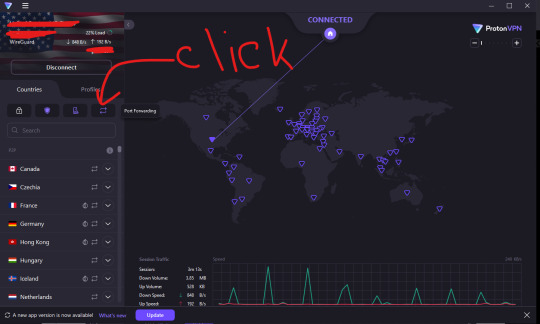
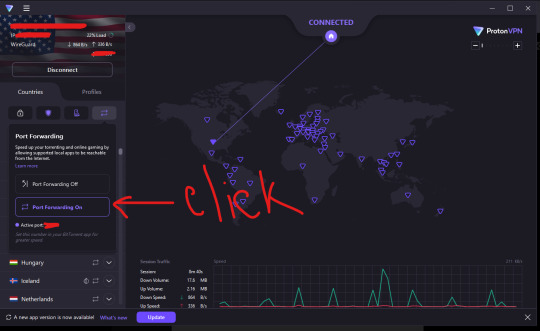
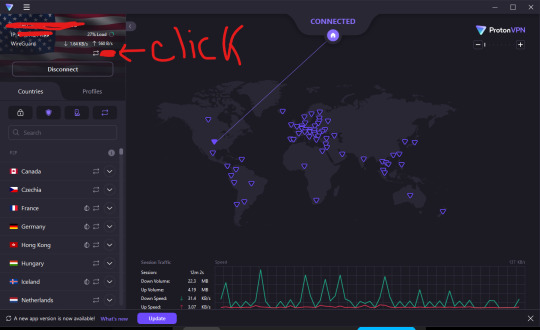



(image descriptions available in the alt text)
once you've done the steps in the image, click "apply" and then "ok" in the bottom right of the settings tab. you will want to make sure that connection status button, located two buttons to the left of your displayed download speed is a GREEN electrical cord plug. if it is red then you cannot download or seed. if it is yellow then you can download, but you cannot seed. it will take a couple of minutes for the specified port to update and the connection status to turn green.
3. now that you've done the hard part, its time for the EVEN HARDER part (this is, however, all completely optional). it is now time to set up tracked tv shows, movies, etc to automatically torrent when updates or a better quality becomes available
you do this using Radarr (for movies), Lidarr (for music), Sonarr (for TV shows), and Prowlarr (as your indexer to manage what torrent hosting clients you want these applications to use). when you download these applications and install them, you are going to want to
you first want to download all of these applications using the links above. you can choose which applications to download based on the things you're going to be downloading, however for any of these applications to work you are going to NEED to download Prowlarr. for simplicity sake i will walk you through setting up all of these from the beginning of my list to the end, except im starting with prowlarr first because that's what you need to set up the rest.
however, when installing ANY of these applications, you are going to have to choose whether to install it as a system tray application or a windows service. I'm going to copy and paste from the Prowlarr wiki what the difference means, though it applies to all of the applications
A Windows Service runs even when the user is not logged in, but special care must be taken since Windows Services cannot access network drives (X:\ mapped drives or \\server\share UNC paths) without special configuration steps.
Additionally the Windows Service runs under the 'Local Service' account, by default this account does not have permissions to access your user's home directory unless permissions have been assigned manually. This is particularly relevant when using download clients that are configured to download to your home directory.
It's therefore advisable to install Prowlarr as a system tray application if the user can remain logged in. The option to do so is provided during the installer.
now that you've installed the programs you want, its time to set up prowlarr. i am once again going to show you how to set it up using pictures

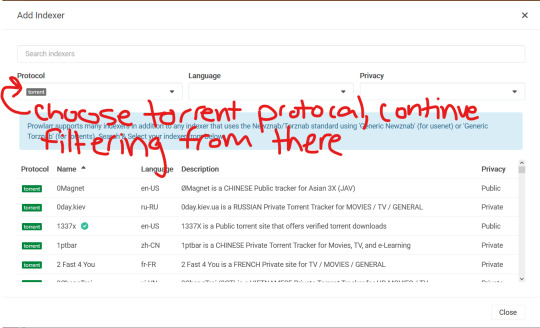

(image descriptions available in the alt text)
that is how you add what torrent indexers (the websites that host torrents) you want to use to prowlarr. I only used TorrentGalaxy as an example, I don't actually use that site. I recommend being VERY careful and selective with what websites you use if they are a public tracker, as any of their torrents can host viruses. do your research before adding them. for convenience, however, I will list all of the public trackers I use so you can add them to Prowlarr if you like:
1337x
IBit
Internet Archive
Nyaa.si
Rarbg
Shana Project
SubsPlease
Torlock
YTS
you can also add private trackers, which is basically the same setup except you will have to input your username and password and/or an api key to allow prowlarr to access your account. I will explain private trackers later.
i will now show you how to connect prowlarr with the other applications you downloaded, once again with images



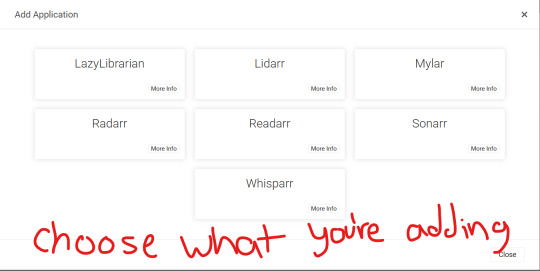

you want to do this with every application you're using.
that's the basics for setting up Prowlarr. you can further customize it with the help of the Prowlarr wiki if you'd like, but this is all I'll be covering in this tutorial.
setting up the other applications pretty intuitive if after setting up prowlarr, however if you do need help this is the video i watched to set up the rest. you only need to watch how to set up one of these applications to know how to set up the rest, and you can ignore literally everything this person is saying besides how to set up sonarr radarr and lidarr. seriously, don't listen to the rest of what this person has to say it will only confuse you. i have the video hyperlinked to where you need to start to learn how to set up these applications (the one she walks you through in depth is sonarr)
4. now that you've set up the torrent trackers (or skipped that part, those are, again, optional), it's time to go back to your torrenting client and configure how it handles your torrents.
you can only download so many megabytes a second, and when you have a million torrents downloading at once it makes every single torrent download at a snails pace because of that. so, what you're going to want to do is set it to download only a certain number of torrents at a time, and queue the rest to download once one torrent finishes.
this setup is pretty self explanatory, so I won't use images and just explain it.
go back to the settings of your torrenting client, and click on the "BitTorrent" tab (this might be a tab specific to qbittorrent, if you are using a different client look for a tab that is called something similar) (you can alternatively just google how to set torrents to queue for your specific client)
click the checkbox next to the option "torrent queuing"
customize how many active downloads and uploads you want. I personally recommend having no more than 6 torrents downloading at a time so that way they can all download relatively fast. i have my seed (upload) limit set to 60 because I'm in private trackers (which i will explain more about later), but if you don't want to seed for whatever reason you can set that to 0 and it SHOULD (don't quote me on this) automatically stop your torrent once its finished downloading. this could also potentially throttle your download speed because torrents don't like it when you're not uploading them while downloading them, don't quote me on that either having downloads set to 0 is not something im familiar with at all
you can optionally also set your download and upload limits in the "speed" category of settings, though i recommend keeping them both at infinity
5. setting up your downloaded media so you can watch it
this part is really easy and ALSO technically optional but it makes your life so much more convenient so i really recommend doing it. we're going to set up Plex Media Server so it can auto sort through your libraries and organize everything.
download plex and create an account
launch the server and go to the settings page, indicated by the wrench icon in the top right
scroll all the way down the settings directory until you get to the 'Manage" subheading and click on "Libraries"
assign your media libraries to the folders on your hard drive. for this you are going to want to keep movies, tv, and music all in separate folders, and you are going to want to keep your tv shows within your tv folder separate as well.
click 'scan library files' and watch plex update your library in real time
there will be times where plex isn't able to grab the metadata for a piece of media you have, but i can tell you how to (hopefully) prevent that from happening:
in the settings menu, go to the "network" tab under the "settings" subheading
uncheck the box next to "Enable server support for IPv6"
thats it! it should be able to get the metadata for all your media now
6. joining private trackers
this is honestly some Advanced levels of torrenting, and you shouldn't join them if you don't have a device that can be on and seeding 24/7
private trackers are torrent trackers that you can only use if you have a registered account with. they generally have a higher quality selection of torrents with faster download speeds due to a higher seeders to leecher ratio. each tracker has their own rules you need to follow, but they all have similar baselines
maintain your download-to-upload ratio (this will be specified in the trackers FRQ)
after you finish downloading something, you then need to seed it for a certain amount of time (normally a week) or else it will be considered a 'hit n run' and you will face the appropriate consequences
some things are free leach, which means you can download them without it contributing negatively to your ratio. if you seed and upload free leaches they will count to your ratio positively, however
most private trackers are invite-only, but some do occasionally have open signups which you can track on r/opensignups
when joining any private tracker, i recommend only downloading things that are free leach until you have built a good buffer between your upload to download ratio.
this is barely a drop in the water explanation of private trackers, but it's a part of torrenting that i feel like most people don't know about and/or don't know how to get started with, so i felt like it was worth mentioning. r/piracy has a more in-depth explanation (and a better "how to get started" guide on their megathread
and that's it! this is my indepth beginners guide to torrenting and piracy. i will maybe come back to this later and add more / make the formatting better (tumblr post formatting has such bad options...)
linked below are some useful resources for torrenting and pirating in general that i have saved.
my favorite public torrent tracker
r/piracy megathread
r/roms megathread for video game console downloading (direct downloads mostly, not torrents)
r/FREEMEDIAHECKYEAH megathread
r/FREEMEDIAHECKYEAH beginners guide to piracy
nintendo switch roms (direct downloads)
nintendo switch emmulator
ns emmulator setup guide
sideload apps on an apple device
hacked spotify ipa (ios app) that you can use above link to sideload
a less convient way to sideload apps onto apple if altstore doesnt work for you
#this post is so fucking long im sorry#and because i have like 3 followers no one is going to reblog it. and thats ok#this took me almost exactly 4 hours to make. lol#and since i put a bunch of outside links here theres no point in putting it in tags to spread the word... thank you tumblr !#save#piracy#<-- formyself lol#anyways to the person who asked hope this helps#if anything doesnt make sense you can DM me and ill hopefully respond also google is your friend#well you should use duckduckgo#but
113 notes
·
View notes
Note
how does the capture styler thing work? Is it just like a pokeball??
Oh boy. Okay, I’m not a like, tech person but I will do my best to explain. Long post ahead.
So for my followers who don’t know, some rangers operate with a capture styler to help them recruit wild pokemon on their missions, as opposed to working with a standard team of pokemon of their own. The styler has two parts, the base styler itself (pic below) and the capture disk, which looks kinda like a spinning top. The capture disk is launched from the styler and then basically remote controlled. You can control the disk to wrap wild pokemon up by leading the disk in circles around it, and once you’ve drawn enough circles the pokemon can be successfully ‘captured’. If the pokemon attacks the disk or the line that is being drawn around it, the damage will eventually cause the disk to disconnect from the styler. If that happens you have to either grab a back up disk or find a different way to solve whatever problem you’re having.
It’s pretty different from capturing a pokemon in a pokeball for a bunch of reasons. A pokemon captured with a styler is still considered a wild pokemon for all intents and purposes. Capturing will briefly calm a wild pokemon, and help establish some communication between the wild pokemon and the ranger. This is mostly just because in addition to the calming effect, the pokemon will also generally stay focused on the ranger and view them as a friend. Capturing doesn’t magically enable us to speak to wild pokemon in the same language as them (sadly), but it does establish enough of a bond that we can get them to help put out a fire, or move a fallen tree, or just hold still while we treat an injury. Stuff like that.
Capturing is also pretty temporary. Eventually that wild pokemon will get bored of hanging out with you, and will likely wander off to continue its wild pokemon life. Once it gets far enough away the effects of the capture will disappear. Most rangers are also not allowed to lead wild pokemon outside of their natural habitat, for I think obvious reasons. The sylers will track where a pokemon is captured and send an alert when you get too far away from their home, warning you that the pokemon will be released automatically if you go much further. This feature doesn’t apply to Top Rangers, but that’s a different conversation.
Partner pokemon, the one that stays by the ranger’s side the whole time, can also assist in captures by providing ‘poke-assists’. This will affect the behaviour of the capture disk in different ways depending on the type of pokemon providing the assist. Michael, my mightyena, can help lengthen the range of the capture disk to make capturing larger wild pokemon way easier.
Lastly, capturing also does a pretty thorough scan of the pokemon. Once a pokemon is captured we can see if it’s hurt, how old it is, and any previous trainers who might have caught it in a pokeball (that data stays tied to the pokemon forever, even after release). That last one is super helpful for determining if a trainer released a pokemon into a habitat it doesn’t belong in, which can result in fines (which is a stupid punishment, but I digress) or suspension of league participation. The data from captured pokemon is recorded and stays with the ranger union database so that rangers and their home-base operators can monitor population levels and overall health of the pokemon in a given area. We also share that data with pokemon researchers when applicable.
Generally, rangers who are new to an area (i.e., they were trained and imported from out of the region), and field op rangers (who take on more specialized missions – that’s me!) are the only ones equipped with stylers. Sadly, not ever ranger can be equipped with one, as they are expensive and only produced in Almia. The idea is that rangers who are familiar with the area they are ranging in don’t need the added boost of being able to quickly bond with wild pokemon, as they should already have a pretty good grasp on the pokemon in that area. Rangers without stylers also tend to keep larger teams of pokemon with them in their pokeballs. Also, you have to complete special courses to use a capture styler (or just be friends with a chill ranger…shhh).
That’s the quick summary! Thanks for the ask buddy friend.
16 notes
·
View notes